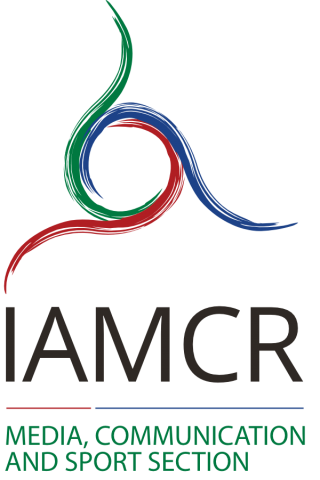
The Media, Communication and Sport Section of the International Association for Media and Communication Research (IAMCR) invites the submission of proposals for papers and panels for IAMCR 2022, which will be held online from 11 to 15 July 2022. The conference will also have a national hub at Tsinghua University in Beijing. The deadline for submission is 9 February 2022, at 23.59 UTC.
See the CfPs of all sections and working groups >
Conference Themes
IAMCR conferences have a main conference theme (with several sub-themes) that is explored from multiple perspectives throughout the conference in plenaries, in the programmes of our sections and working groups, and in the Flow34 virtual cinema and podcasts stream. They also have many themes defined by our 33 thematic sections and working groups. Proposals submitted to sections and working groups may be centered on an aspect of the main conference theme as it relates to the central concerns of the section or working group, or they may address the additional themes identified by the section or working group in their individual calls for proposals.
The main theme for IAMCR 2022, “Communication Research in the Era of Neo-Globalisation: Reorientations, Challenges and Changing Contexts,” is concerned with possibilities for rethinking communication research agendas in the post-pandemic world, which has seen dramatic shifts in the way we interact and understand our physical, social, cultural, political and material environments.
Eight sub-themes of this central theme have been identified: Reorienting Media and Communication Research in the Era of Neo-Globalisation; Artificial Intelligence in Global Communication Contexts; Cultural Identities and Dis-Identities in the Era of Neo-Globalisation; Communication for Sustainability: Climate Change, Environment, and Health; Media Ethics and Principles in the Digital Age; Media, Communication, and the Construction of Global Public Health; Data/Digital Science and Intercultural Communication; Digital Platforms and Public Service: Science, Technology and Sustainability. See the complete theme description and rationale here.
The Media, Communication and Sport Section has traditionally been a platform for inter/trans/multi-disciplinary inspired work and we encourage such papers and panel sessions again. We invite submissions of individual research papers and complete panels. We welcome submissions from all theoretical and methodological perspectives.
In 2022, we particularly welcome contributions that bridge the study of media, communication and sport and the conference’s main theme “Communication Research in the Era of Neo-Globalisation: Reorientations, Challenges and Changing Contexts”. This theme is concerned with possibilities for rethinking communication research agendas in the post-pandemic world, which has seen dramatic shifts in the way we interact and understand our physical, social, cultural, political and material environments. Authors should consider any of the ideas listed below as relevant to the Media, Communication and Sport Section. This list does not exhaust the potential categories of submissions. Some of the topics that may be addressed are:
- Diversity, inclusiveness and respect in sports communication: Gender, media and sport, Sporting masculinities/femininities, Race and ethnicity portrayals in media, Minority sports, Disability sport, Sexual diversity, Sport and social inclusion
- Sporting mega-events: politics, representation, and consumption
- Media, sport and cultural citizenship
- New trends and challenges in the global sports media ecosystem
- The role of sports communication in the COVID-19 pandemic and post-pandemic era
- Evolution of the sports media rights market in the age of media portals
- The role of emerging technologies in sport communication: digital and mobile media, eSports, artificial intelligence (AI), virtual reality, and beyond
- Social networking sites and their use by athletes, fans, media, and professional sports organizations
- Ethics and accountability in sports journalism
- Sport, sustainability, and the communication of environmental issues
- Crisis communication and image repair in sport
All papers, from the full range of perspectives on the study of Media, Communication and Sport will be considered.
Guidelines for abstracts
Abstracts are requested for the Online Conference Papers component. Abstracts submitted to the Media, Communication and Sport Section should have between 300 and 500 words and must be submitted online at https://iamcr2022.exordo.com. Abstracts submitted by email will not be accepted.
The deadline to submit abstracts is 9 February 2022 at 23h59 UTC.
See important dates and deadlines to keep in mind
It is expected that authors will submit only one (1) abstract. However, under no circumstances should there be more than two (2) abstracts bearing the name of the same author, either individually or as first author. No more than one 1 abstract can be submitted by an author to the Media, Communication and Sport Section. Please note also that the same abstract or another version with minor variations in title or content must not be submitted to more than one section or working group. Any such submissions will be deemed to be in breach of the conference guidelines and will be rejected.
Proposals are accepted for both single Papers and for Panels with several papers (in which you propose multiple papers that address a single theme). Please note that there are special procedures for submitting panel proposals. You can find the detailed procedures when submitting your abstract online in the abstract submission system.
Submitted abstracts will generally be evaluated on the basis of:
- Theoretical contribution
- Methods
- Quality of writing
- Literature review
- Relevance of the proposal to the work of the Media, Communication and Sport section
- Originality and/or significance
Languages
The Media, Communication and Sport Section accepts abstracts in English.
For further information about the conference contact beijing2022@iamcr.org
For further information about the Media, Communication and Sport section, its themes, submissions, and panels please contact the co-chairs of the section:
Alina Bernstein, PhD
School of media studies, College of management academic studies (COMAS)
The Steve Tisch School of Film and Television, Tel Aviv University, Israel
alinabernstein(at)gmail.com
Xavier Ramon, PhD
Department of Communication, Pompeu Fabra University, Spain
xavier.ramon(at)upf.edu